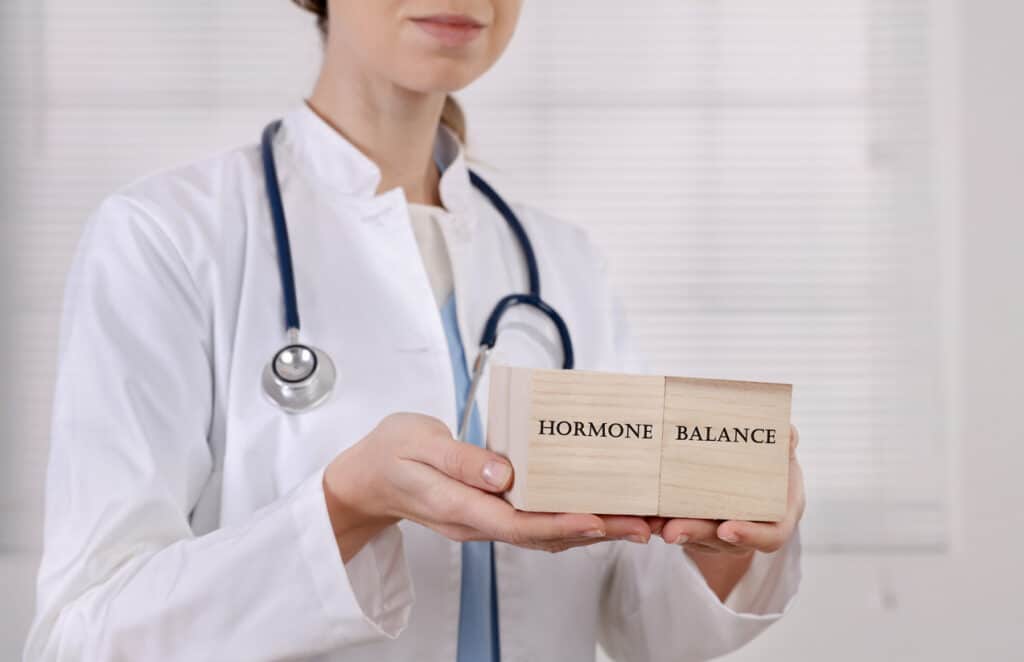Hormonal balance plays a fundamental role in skin health, particularly for women as they go through menopause. Estrogen, progesterone, and testosterone each influence the skin’s structure, resilience, hydration, and ability to repair itself. The decline in estrogen during menopause is one of the most significant factors contributing to skin aging, accelerating the development of wrinkles, dryness, thinning, and reduced elasticity.
The Role of Estrogen in Skin Health
Estrogen is essential for maintaining youthful, resilient skin. It supports several key processes:
- Collagen Production and Maintenance
- Estrogen stimulates fibroblasts to produce collagen, the structural protein that gives skin its firmness and elasticity.
- During menopause, collagen production declines by about 30% within the first five years and continues to decrease gradually, leading to sagging and increased wrinkle formation.
- Skin Hydration and Barrier Function
- Estrogen enhances the production of hyaluronic acid, a molecule that retains moisture in the skin, keeping it plump and hydrated.
- It regulates sebum production, preventing excessive dryness or oiliness.
- A lack of estrogen leads to a weakened skin barrier, making the skin more prone to sensitivity, irritation, and dehydration.
- Antioxidant Protection and Wound Healing
- Estrogen has anti-inflammatory and antioxidant effects, helping the skin combat oxidative stress and environmental damage (UV radiation, pollution, etc.).
- It enhances keratinocyte proliferation, which aids in skin regeneration and wound healing.
- When estrogen declines, healing slows down, and sun damage accumulates more rapidly.
- Blood Flow and Nutrient Delivery
- Estrogen promotes microcirculation, ensuring the skin receives oxygen and nutrients essential for cellular repair.
- Reduced estrogen levels cause decreased blood flow, leading to duller, less radiant skin.
- Fat Distribution and Facial Fullness
- Subcutaneous fat in the face provides volume and structure, preventing a sunken or hollowed-out appearance.
- Estrogen helps maintain fat deposition in the face; its decline contributes to facial volume loss, making wrinkles more pronounced.
The Impact of Menopause on Skin
As estrogen levels drop, the following changes occur:
- Increased Wrinkles and Fine Lines – Due to a loss of collagen and moisture.
- Thinning Skin – The epidermis and dermis become thinner, leading to more fragile skin.
- Reduced Elasticity – Skin becomes more prone to sagging, especially in areas like the jawline and cheeks.
- Delayed Healing – Wounds, acne scars, and skin damage take longer to repair.
- Increased Sensitivity and Redness – A weakened skin barrier makes the skin more reactive.
How Hormone Therapy Can Help
For many women, bioidentical hormone replacement therapy (BHRT) or traditional HRT can help mitigate some of these skin-aging effects.
- Topical Estrogen Creams: Applied directly to the skin, these can help restore hydration and elasticity.
- Oral or Patch-Based HRT: Systemic hormone therapy may slow collagen loss, improve hydration, and reduce wrinkle formation.
However, HRT should be individualized, as it may not be suitable for everyone due to risks such as increased clotting potential or breast cancer concerns. The benefits must be weighed against risks based on each woman’s medical history.
The Role of Progesterone and Testosterone in Skin Health
While estrogen is the primary hormone influencing skin integrity, progesterone and testosterone also play essential roles in maintaining healthy skin. Their balance is particularly crucial during menopause, as shifts in these hormones can exacerbate skin aging, dryness, and changes in texture.
Progesterone: The Skin’s Regulator
Progesterone primarily supports skin hydration and elasticity by influencing sebaceous gland activity and collagen maintenance. Here’s how it affects the skin:
- Hydration and Sebum Production
- Progesterone helps regulate sebaceous (oil) glands, preventing excessive dryness or oiliness.
- As progesterone declines during menopause, skin may become drier, contributing to fine lines and loss of suppleness.
- Anti-Inflammatory Effects
- Progesterone has a natural anti-inflammatory effect, helping to calm redness, irritation, and acne breakouts.
- An imbalance between progesterone and estrogen (often seen in perimenopause) can lead to hormonal acneor increased skin sensitivity.
- Collagen and Elasticity
- Progesterone works with estrogen to preserve collagen, although its role is more indirect.
- Low progesterone can result in slackened skin, particularly around the jawline and neck.
Testosterone: Friend or Foe to Women’s Skin?
Testosterone is often thought of as a male hormone, but women have it too—in much smaller amounts. It plays a key role in sebum production, skin thickness, and muscle tone. However, fluctuations can have negative effects:
- Sebum Regulation and Acne Risk
- Excess testosterone can cause overactive sebaceous glands, leading to adult acne, particularly around the jawline and chin.
- Some menopausal women experience a relative increase in testosterone levels due to the sharper drop in estrogen, leading to increased facial oiliness, clogged pores, and breakouts.
- Skin Firmness and Thickness
- Testosterone helps maintain skin thickness and muscle tone, preventing excessive sagging.
- A decline in testosterone may contribute to skin thinning and increased fragility over time.
- Hair Growth and Loss
- Imbalances in testosterone can lead to excess facial hair (hirsutism) or thinning scalp hair, both of which can be distressing for women in menopause.
- This effect is often due to increased sensitivity to androgens rather than an actual increase in testosterone levels.
Balancing Hormones for Skin Health
A comprehensive approach to hormone balance is key to maintaining youthful skin:
- Estrogen replacement therapy can restore moisture, collagen, and elasticity.
- Progesterone therapy (oral or topical) may improve hydration and inflammation.
- Testosterone replacement (when necessary) can support skin thickness and muscle tone but must be carefully monitored to prevent excess oil production or hair changes.
- Lifestyle modifications, including nutrition, exercise, and stress management, support natural hormone regulation.
Micronutrients for Skin Resilience and Anti-Aging
With the foundation of hormonal balance covered, let’s now focus on micronutrients that support collagen production, hydration, antioxidant defense, and skin barrier integrity. These nutrients work synergistically with hormones to maintain youthful, resilient skin.
1.Collagen-Supporting Nutrients
Collagen is the scaffolding of the skin, providing structure and firmness. Several key nutrients contribute to its production and preservation:
Vitamin C (Ascorbic Acid):
- Essential for collagen synthesis by activating enzymes needed to form stable collagen fibers.
- Protects against oxidative stress, which accelerates collagen breakdown.
- Supports wound healing, reducing post-inflammatory hyperpigmentation and scarring.
- Sources: Citrus fruits, bell peppers, kiwi, strawberries, and dark leafy greens.
Zinc:
- Cofactor for collagen production, aiding in wound healing and skin regeneration.
- Regulates inflammation and supports the immune system, reducing acne breakouts.
- Prevents excessive breakdown of collagen by inhibiting matrix metalloproteinases (MMPs), enzymes that degrade skin structure.
- Sources: Oysters, beef, pumpkin seeds, cashews, chickpeas.
Copper:
- Essential for cross-linking collagen and elastin, providing strength to skin tissue.
- Supports melanin production, preventing hyperpigmentation disorders.
- Sources: Shellfish, nuts, seeds, dark chocolate, organ meats.
Silica:
- Strengthens connective tissue and enhances collagen formation.
- Improves skin elasticity and hydration.
- Sources: Cucumbers, bananas, oats, bell peppers, and mineral-rich water.
2.Hydration and Skin Barrier Support
The skin’s outer layer (stratum corneum) acts as a moisture barrier, preventing water loss and maintaining plumpness.
Hyaluronic Acid:
- A naturally occurring molecule that retains up to 1,000 times its weight in water.
- Maintains skin hydration, reduces fine lines, and supports elasticity.
- Can be supplemented orally or applied topically.
- Sources: Bone broth, soy-based foods (stimulates natural hyaluronic acid production).
Omega-3 Fatty Acids (DHA & EPA):
- Reduce inflammation, preventing dry, irritated, or red skin.
- Strengthen the skin barrier, preventing trans-epidermal water loss (TEWL).
- Improve elasticity, giving the skin a plump and youthful appearance.
- Sources: Fatty fish (salmon, mackerel, sardines), flaxseeds, walnuts, chia seeds.
Ceramides:
- Lipid molecules that lock in moisture, keeping the skin smooth and resilient.
- Essential for restoring the skin barrier, especially for individuals with dry or sensitive skin.
- Sources: Brown rice, wheat germ, sweet potatoes, ceramide-containing skincare products.
3.Antioxidants: Protecting Against Skin Aging
Antioxidants neutralize free radicals, which are unstable molecules that cause DNA damage, inflammation, and collagen breakdown.
Vitamin E (Tocopherol):
- Protects cell membranes from oxidative stress, reducing premature aging.
- Enhances skin repair and hydration.
- Works synergistically with Vitamin C to boost antioxidant defenses.
- Sources: Almonds, sunflower seeds, avocados, spinach.
Polyphenols (Resveratrol, EGCG, Quercetin):
- Found in plants, polyphenols reduce inflammation and protect collagen.
- Resveratrol (red grapes, berries, wine) protects against UV damage.
- EGCG (Green Tea) fights oxidative stress and improves skin elasticity.
- Quercetin (Onions, Apples, Capers) reduces inflammation and redness.
Glutathione:
- The master antioxidant, detoxifying the body and brightening the skin.
- Reduces hyperpigmentation and enhances skin repair.
- Sources: Asparagus, spinach, avocado, sulfur-rich foods (garlic, onions).
4.Skin Firmness & Elasticity
These nutrients prevent sagging, loss of elasticity, and uneven texture.
Coenzyme Q10 (Ubiquinol):
- Boosts mitochondrial energy production, helping skin cells regenerate.
- Reduces oxidative damage that accelerates aging.
- Sources: Fatty fish, nuts, broccoli, whole grains.
Collagen Peptides:
- Directly increase collagen density in the skin when consumed orally.
- Improve skin elasticity and reduce fine lines and wrinkles.
- Sources: Collagen powder (hydrolyzed collagen), bone broth.










